Intercultural Communication That Went Wrong
VerifiedAdded on 2023/04/05
|5
|917
|288
AI Summary
This essay presents a scenario where intercultural communication goes wrong between a Chinese senior and an English-speaking employee. It analyzes the failure, discusses the reasons, and explores the influence of globalization. Barriers to intercultural communication are also discussed.
Contribute Materials
Your contribution can guide someone’s learning journey. Share your
documents today.
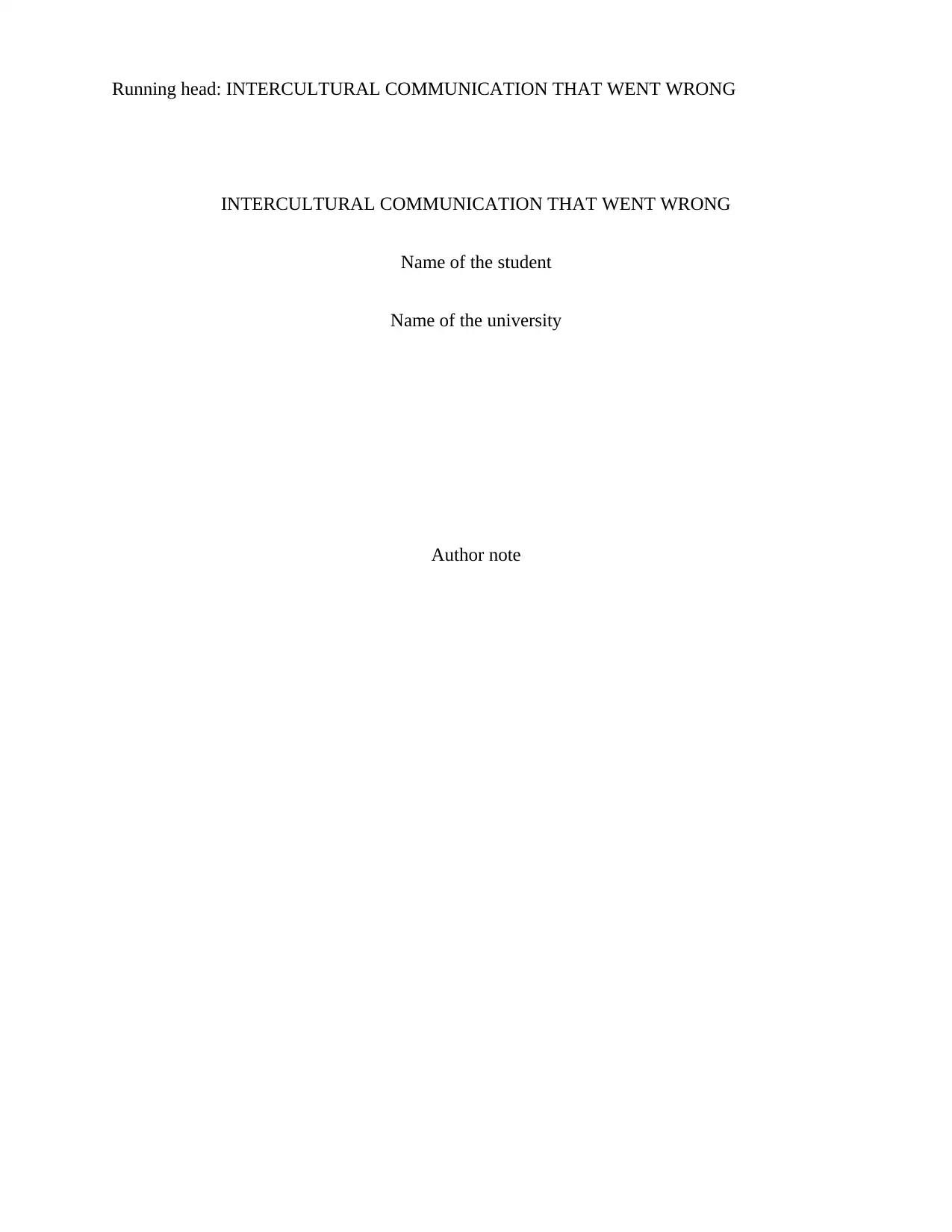
Running head: INTERCULTURAL COMMUNICATION THAT WENT WRONG
INTERCULTURAL COMMUNICATION THAT WENT WRONG
Name of the student
Name of the university
Author note
INTERCULTURAL COMMUNICATION THAT WENT WRONG
Name of the student
Name of the university
Author note
Secure Best Marks with AI Grader
Need help grading? Try our AI Grader for instant feedback on your assignments.
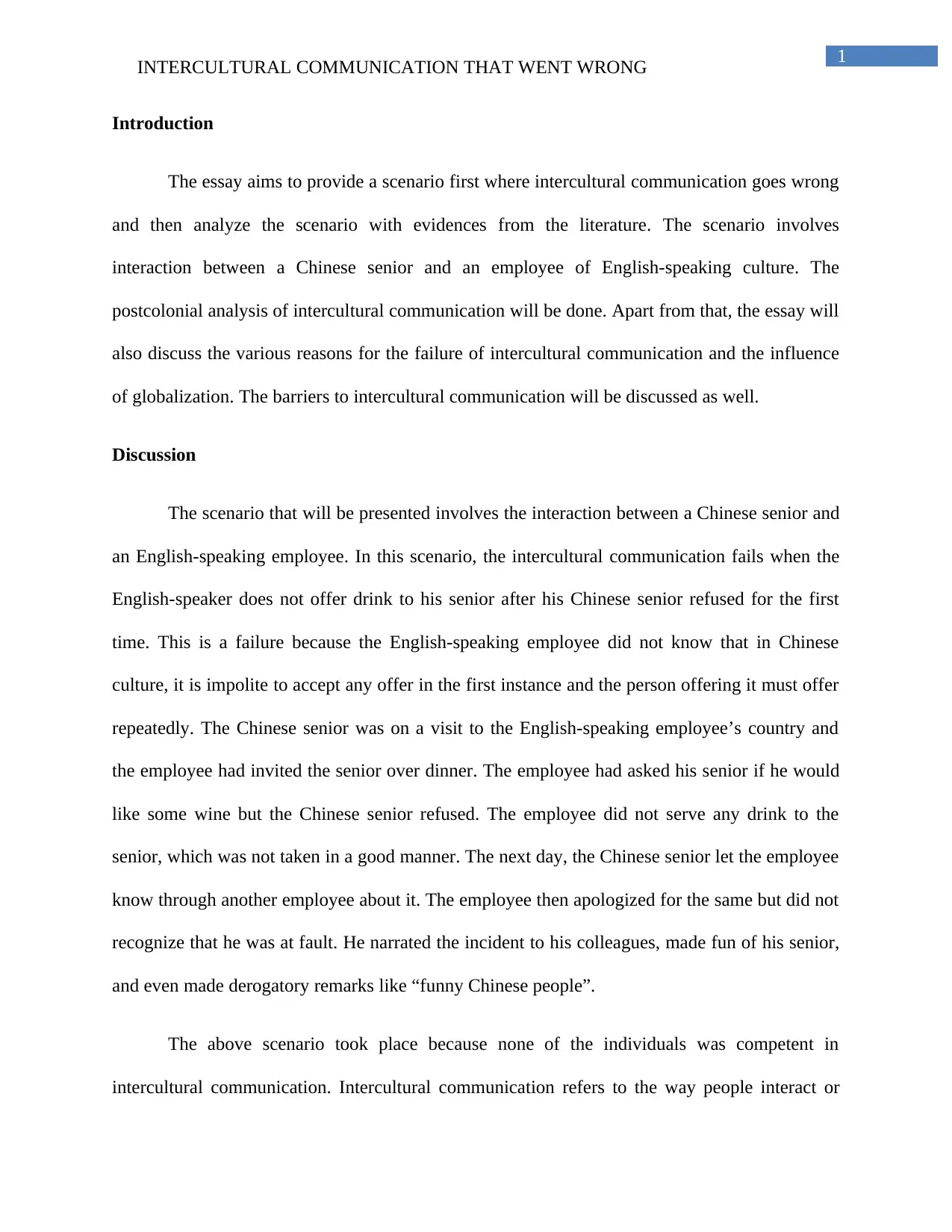
1
INTERCULTURAL COMMUNICATION THAT WENT WRONG
Introduction
The essay aims to provide a scenario first where intercultural communication goes wrong
and then analyze the scenario with evidences from the literature. The scenario involves
interaction between a Chinese senior and an employee of English-speaking culture. The
postcolonial analysis of intercultural communication will be done. Apart from that, the essay will
also discuss the various reasons for the failure of intercultural communication and the influence
of globalization. The barriers to intercultural communication will be discussed as well.
Discussion
The scenario that will be presented involves the interaction between a Chinese senior and
an English-speaking employee. In this scenario, the intercultural communication fails when the
English-speaker does not offer drink to his senior after his Chinese senior refused for the first
time. This is a failure because the English-speaking employee did not know that in Chinese
culture, it is impolite to accept any offer in the first instance and the person offering it must offer
repeatedly. The Chinese senior was on a visit to the English-speaking employee’s country and
the employee had invited the senior over dinner. The employee had asked his senior if he would
like some wine but the Chinese senior refused. The employee did not serve any drink to the
senior, which was not taken in a good manner. The next day, the Chinese senior let the employee
know through another employee about it. The employee then apologized for the same but did not
recognize that he was at fault. He narrated the incident to his colleagues, made fun of his senior,
and even made derogatory remarks like “funny Chinese people”.
The above scenario took place because none of the individuals was competent in
intercultural communication. Intercultural communication refers to the way people interact or
INTERCULTURAL COMMUNICATION THAT WENT WRONG
Introduction
The essay aims to provide a scenario first where intercultural communication goes wrong
and then analyze the scenario with evidences from the literature. The scenario involves
interaction between a Chinese senior and an employee of English-speaking culture. The
postcolonial analysis of intercultural communication will be done. Apart from that, the essay will
also discuss the various reasons for the failure of intercultural communication and the influence
of globalization. The barriers to intercultural communication will be discussed as well.
Discussion
The scenario that will be presented involves the interaction between a Chinese senior and
an English-speaking employee. In this scenario, the intercultural communication fails when the
English-speaker does not offer drink to his senior after his Chinese senior refused for the first
time. This is a failure because the English-speaking employee did not know that in Chinese
culture, it is impolite to accept any offer in the first instance and the person offering it must offer
repeatedly. The Chinese senior was on a visit to the English-speaking employee’s country and
the employee had invited the senior over dinner. The employee had asked his senior if he would
like some wine but the Chinese senior refused. The employee did not serve any drink to the
senior, which was not taken in a good manner. The next day, the Chinese senior let the employee
know through another employee about it. The employee then apologized for the same but did not
recognize that he was at fault. He narrated the incident to his colleagues, made fun of his senior,
and even made derogatory remarks like “funny Chinese people”.
The above scenario took place because none of the individuals was competent in
intercultural communication. Intercultural communication refers to the way people interact or
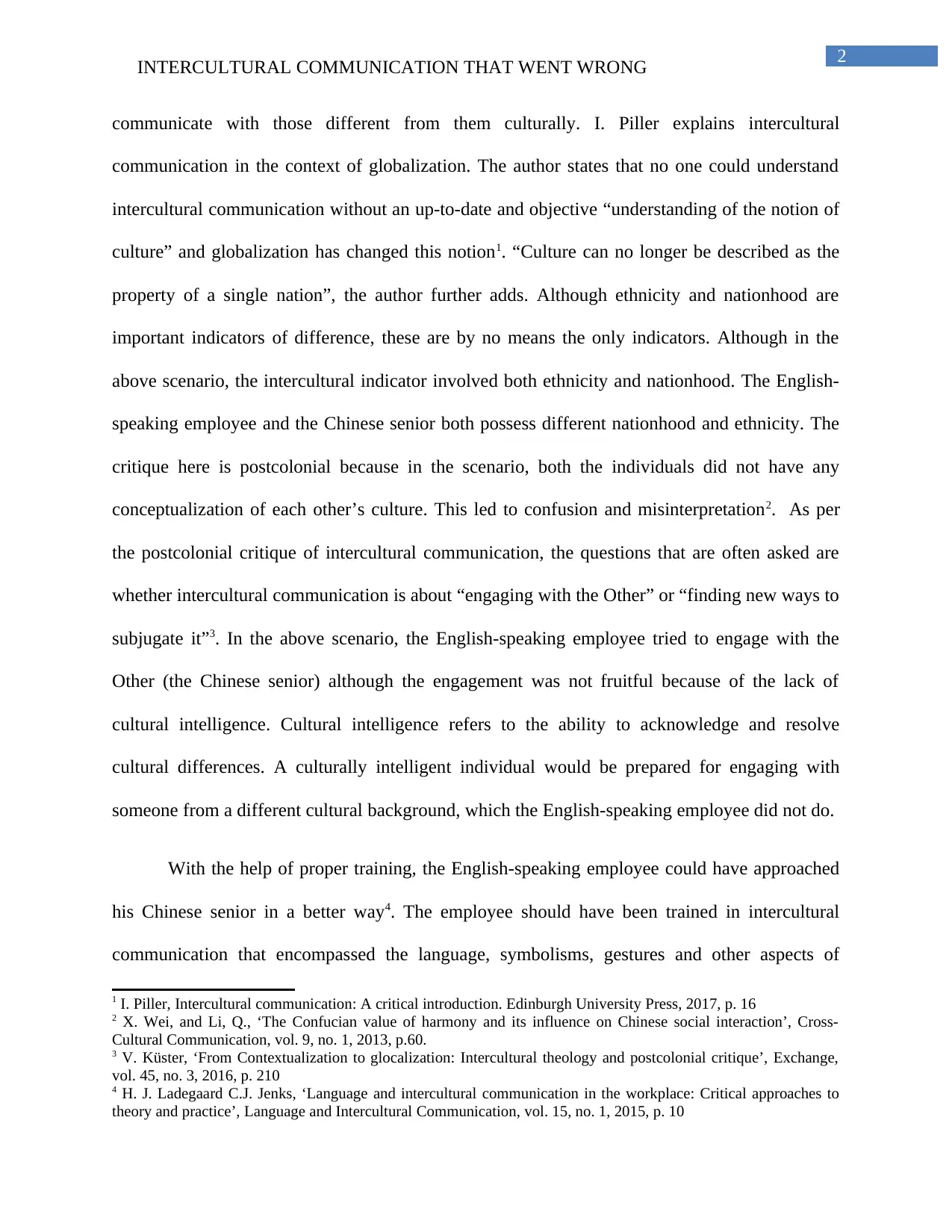
2
INTERCULTURAL COMMUNICATION THAT WENT WRONG
communicate with those different from them culturally. I. Piller explains intercultural
communication in the context of globalization. The author states that no one could understand
intercultural communication without an up-to-date and objective “understanding of the notion of
culture” and globalization has changed this notion1. “Culture can no longer be described as the
property of a single nation”, the author further adds. Although ethnicity and nationhood are
important indicators of difference, these are by no means the only indicators. Although in the
above scenario, the intercultural indicator involved both ethnicity and nationhood. The English-
speaking employee and the Chinese senior both possess different nationhood and ethnicity. The
critique here is postcolonial because in the scenario, both the individuals did not have any
conceptualization of each other’s culture. This led to confusion and misinterpretation2. As per
the postcolonial critique of intercultural communication, the questions that are often asked are
whether intercultural communication is about “engaging with the Other” or “finding new ways to
subjugate it”3. In the above scenario, the English-speaking employee tried to engage with the
Other (the Chinese senior) although the engagement was not fruitful because of the lack of
cultural intelligence. Cultural intelligence refers to the ability to acknowledge and resolve
cultural differences. A culturally intelligent individual would be prepared for engaging with
someone from a different cultural background, which the English-speaking employee did not do.
With the help of proper training, the English-speaking employee could have approached
his Chinese senior in a better way4. The employee should have been trained in intercultural
communication that encompassed the language, symbolisms, gestures and other aspects of
1 I. Piller, Intercultural communication: A critical introduction. Edinburgh University Press, 2017, p. 16
2 X. Wei, and Li, Q., ‘The Confucian value of harmony and its influence on Chinese social interaction’, Cross-
Cultural Communication, vol. 9, no. 1, 2013, p.60.
3 V. Küster, ‘From Contextualization to glocalization: Intercultural theology and postcolonial critique’, Exchange,
vol. 45, no. 3, 2016, p. 210
4 H. J. Ladegaard C.J. Jenks, ‘Language and intercultural communication in the workplace: Critical approaches to
theory and practice’, Language and Intercultural Communication, vol. 15, no. 1, 2015, p. 10
INTERCULTURAL COMMUNICATION THAT WENT WRONG
communicate with those different from them culturally. I. Piller explains intercultural
communication in the context of globalization. The author states that no one could understand
intercultural communication without an up-to-date and objective “understanding of the notion of
culture” and globalization has changed this notion1. “Culture can no longer be described as the
property of a single nation”, the author further adds. Although ethnicity and nationhood are
important indicators of difference, these are by no means the only indicators. Although in the
above scenario, the intercultural indicator involved both ethnicity and nationhood. The English-
speaking employee and the Chinese senior both possess different nationhood and ethnicity. The
critique here is postcolonial because in the scenario, both the individuals did not have any
conceptualization of each other’s culture. This led to confusion and misinterpretation2. As per
the postcolonial critique of intercultural communication, the questions that are often asked are
whether intercultural communication is about “engaging with the Other” or “finding new ways to
subjugate it”3. In the above scenario, the English-speaking employee tried to engage with the
Other (the Chinese senior) although the engagement was not fruitful because of the lack of
cultural intelligence. Cultural intelligence refers to the ability to acknowledge and resolve
cultural differences. A culturally intelligent individual would be prepared for engaging with
someone from a different cultural background, which the English-speaking employee did not do.
With the help of proper training, the English-speaking employee could have approached
his Chinese senior in a better way4. The employee should have been trained in intercultural
communication that encompassed the language, symbolisms, gestures and other aspects of
1 I. Piller, Intercultural communication: A critical introduction. Edinburgh University Press, 2017, p. 16
2 X. Wei, and Li, Q., ‘The Confucian value of harmony and its influence on Chinese social interaction’, Cross-
Cultural Communication, vol. 9, no. 1, 2013, p.60.
3 V. Küster, ‘From Contextualization to glocalization: Intercultural theology and postcolonial critique’, Exchange,
vol. 45, no. 3, 2016, p. 210
4 H. J. Ladegaard C.J. Jenks, ‘Language and intercultural communication in the workplace: Critical approaches to
theory and practice’, Language and Intercultural Communication, vol. 15, no. 1, 2015, p. 10
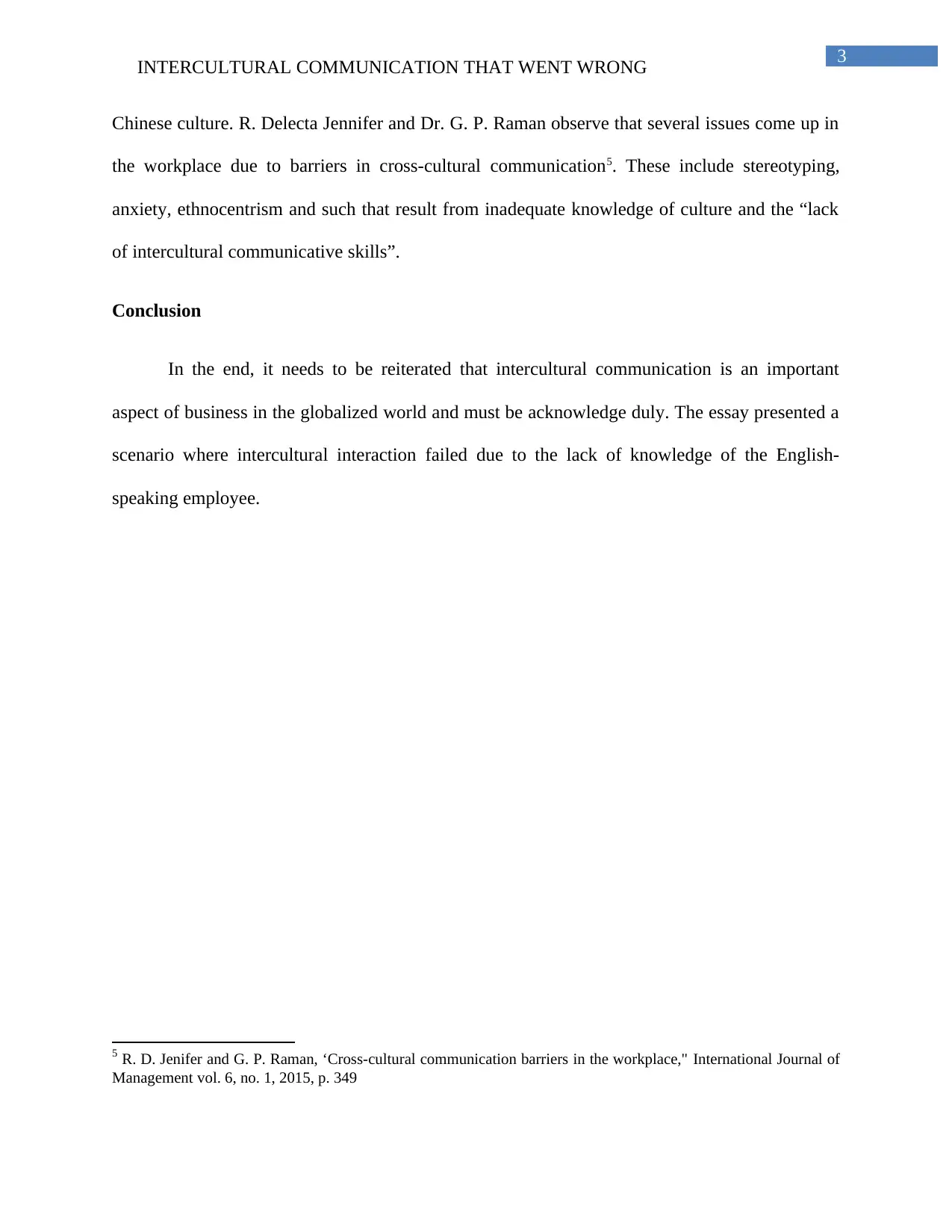
3
INTERCULTURAL COMMUNICATION THAT WENT WRONG
Chinese culture. R. Delecta Jennifer and Dr. G. P. Raman observe that several issues come up in
the workplace due to barriers in cross-cultural communication5. These include stereotyping,
anxiety, ethnocentrism and such that result from inadequate knowledge of culture and the “lack
of intercultural communicative skills”.
Conclusion
In the end, it needs to be reiterated that intercultural communication is an important
aspect of business in the globalized world and must be acknowledge duly. The essay presented a
scenario where intercultural interaction failed due to the lack of knowledge of the English-
speaking employee.
5 R. D. Jenifer and G. P. Raman, ‘Cross-cultural communication barriers in the workplace," International Journal of
Management vol. 6, no. 1, 2015, p. 349
INTERCULTURAL COMMUNICATION THAT WENT WRONG
Chinese culture. R. Delecta Jennifer and Dr. G. P. Raman observe that several issues come up in
the workplace due to barriers in cross-cultural communication5. These include stereotyping,
anxiety, ethnocentrism and such that result from inadequate knowledge of culture and the “lack
of intercultural communicative skills”.
Conclusion
In the end, it needs to be reiterated that intercultural communication is an important
aspect of business in the globalized world and must be acknowledge duly. The essay presented a
scenario where intercultural interaction failed due to the lack of knowledge of the English-
speaking employee.
5 R. D. Jenifer and G. P. Raman, ‘Cross-cultural communication barriers in the workplace," International Journal of
Management vol. 6, no. 1, 2015, p. 349
Secure Best Marks with AI Grader
Need help grading? Try our AI Grader for instant feedback on your assignments.
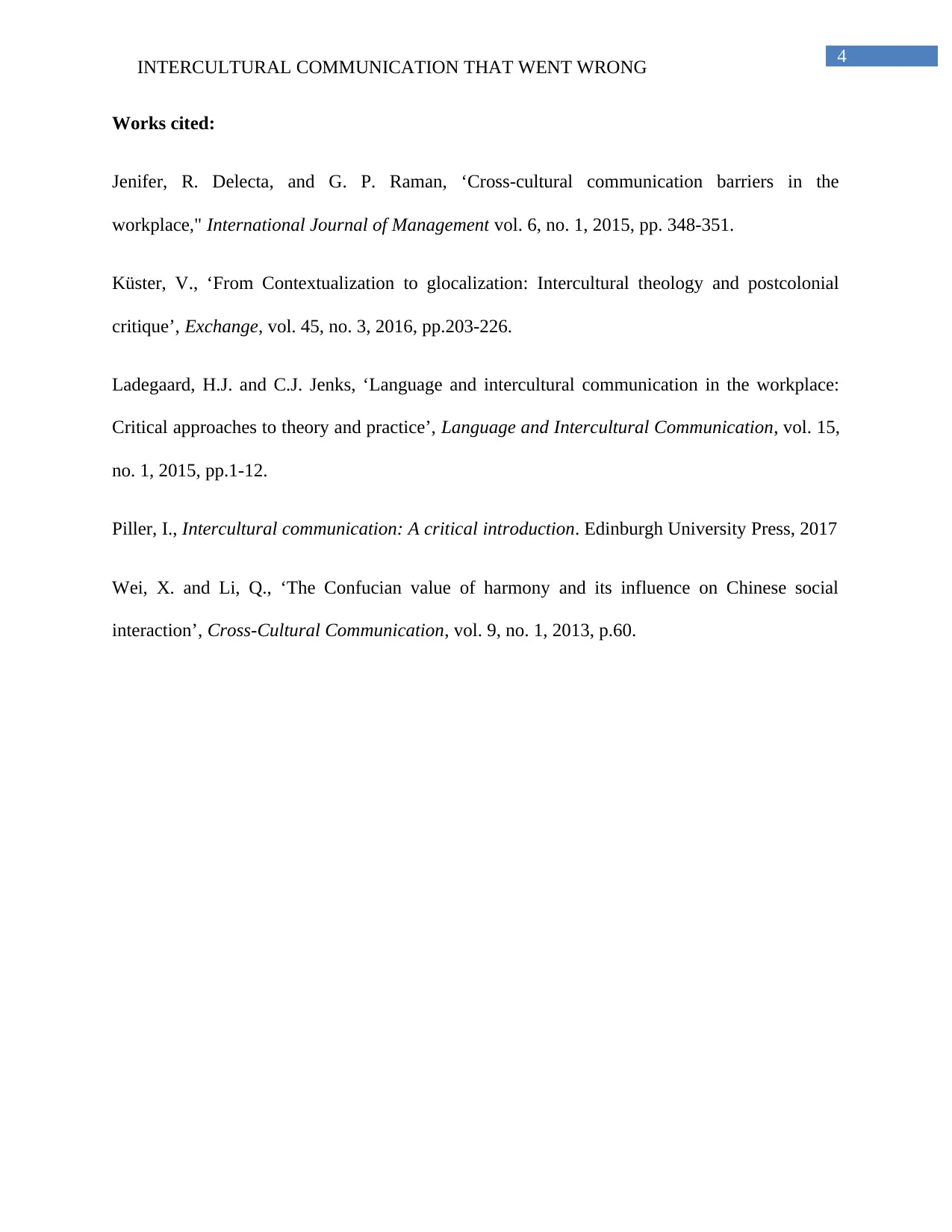
4
INTERCULTURAL COMMUNICATION THAT WENT WRONG
Works cited:
Jenifer, R. Delecta, and G. P. Raman, ‘Cross-cultural communication barriers in the
workplace," International Journal of Management vol. 6, no. 1, 2015, pp. 348-351.
Küster, V., ‘From Contextualization to glocalization: Intercultural theology and postcolonial
critique’, Exchange, vol. 45, no. 3, 2016, pp.203-226.
Ladegaard, H.J. and C.J. Jenks, ‘Language and intercultural communication in the workplace:
Critical approaches to theory and practice’, Language and Intercultural Communication, vol. 15,
no. 1, 2015, pp.1-12.
Piller, I., Intercultural communication: A critical introduction. Edinburgh University Press, 2017
Wei, X. and Li, Q., ‘The Confucian value of harmony and its influence on Chinese social
interaction’, Cross-Cultural Communication, vol. 9, no. 1, 2013, p.60.
INTERCULTURAL COMMUNICATION THAT WENT WRONG
Works cited:
Jenifer, R. Delecta, and G. P. Raman, ‘Cross-cultural communication barriers in the
workplace," International Journal of Management vol. 6, no. 1, 2015, pp. 348-351.
Küster, V., ‘From Contextualization to glocalization: Intercultural theology and postcolonial
critique’, Exchange, vol. 45, no. 3, 2016, pp.203-226.
Ladegaard, H.J. and C.J. Jenks, ‘Language and intercultural communication in the workplace:
Critical approaches to theory and practice’, Language and Intercultural Communication, vol. 15,
no. 1, 2015, pp.1-12.
Piller, I., Intercultural communication: A critical introduction. Edinburgh University Press, 2017
Wei, X. and Li, Q., ‘The Confucian value of harmony and its influence on Chinese social
interaction’, Cross-Cultural Communication, vol. 9, no. 1, 2013, p.60.
1 out of 5
Your All-in-One AI-Powered Toolkit for Academic Success.
+13062052269
info@desklib.com
Available 24*7 on WhatsApp / Email
![[object Object]](/_next/static/media/star-bottom.7253800d.svg)
Unlock your academic potential
© 2024 | Zucol Services PVT LTD | All rights reserved.